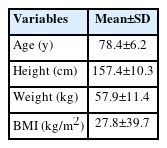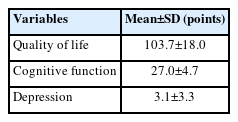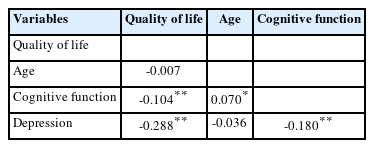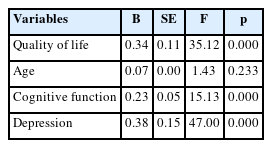경상남도에 거주하는 노인의 삶의 질, 우울증, 인지기능의 상관관계
Correlation between Quality of Life, Depression, and Cognitive Function of the Elderly Living in Gyeongsangnam-do
Article information
Trans Abstract
Objectives
The purpose of this study is to find out the correlation between the quality of life, depression, and cognitive function of the elderly, and to identify the causal relationship on each variable to provide basic data for elderly activities and related research and scientific basic data necessary to improve elderly welfare.
Methods
A total of 821 samples were used for data analysis by selecting male and female seniors aged 65 or older as the population who participated in the Gyeongnam Niyagara customized service project program in 2022. Pearson correlation analysis was conducted to find out the correlation, and regression analysis was conducted to verify the relevance.
Results
First, as a result of analyzing the correlation of all variables, there was a significant negative correlation between quality of life and cognitive function (p =-0.104), there was also a significant negative correlation between quality of life and depression (p =-0.288). There was a significant static correlation between age and cognitive function (p = 0.070), and a significant static correlation between cognitive function and depression (p = 0.180). Second, as a result of conducting a regression analysis to confirm the causal relationship on each variable, the quality of life (F=35.12, p = 0.000), cognitive function (F=15.13, p = 0.000), depression (F=47.00, p = 0.000) showed statistical significance, and age (F=1.43, p = 0.233) showed no statistical significance.
Conclusions
Based on the results of this study, it is expected that various policies and follow-up studies will be conducted to improve the quality of life, relieve depression, and cognitive function health of the elderly.
서 론
우리나라 노인인구 증가 속도는 유례없이 빠르다. 노인인구는 2020년 기준으로 15.7%로 나타났고, 약 50년 뒤인 2070년에는 한국 인구 절반에 이르는 46%가 만 65세 이상 노인으로 구성될 것으로 내다보았다[1]. 이에 노인들의 영향력은 커지고 있고, 노인들의 신체적, 정신적 건강에 대한 사회적 관심이 더욱 필요한 실정이다.
노인들로부터 나타나는 건강에 관한 문제들은 삶의 질, 인지기능(치매), 그리고 우울증에 관한 연구가 주로 수행되어왔다. 인지기능 저하는 신체기능 저하에도 밀접한 관련이 있으며 노인에게 나타나는 대표적인 노화 중 하나이다[2,3]. 인지기능 장애에 영향을 주는 원인으로 미토콘드리아 기능 저하로 인한 신체기능 저하[4], 저조한 신체 기동성[5], 불균형한 영양 섭취[6], 그리고 질병과 체력 저하[7]가 노인의 인지기능에 직접적인 영향을 미치는 것으로 보고하였다. 이처럼 노인들에게 인지기능에 장애가 발생하여 인지기능 저하로 나타나게 되면 노인 삶의 질과 우울증에도 영향을 나타냈다[8].
삶의 질은 인지기능만큼이나 중요한 요인으로 국내 노인들을 대상으로 삶의 질에 영향을 나타내는 요인들을 분석한 결과 성별, 연령, 교육상태, 소득, 흡연, 음주, 주관적 건강 인식 등과 같은 경제와 관련된 요인들이 국내 노인들의 삶의 질에 직접적인 영향을 미치는 것으로 나타났다[9].
노인들에게 우울증은 자살 위험 요인 중 하나이며[10], 삶의 질, 신체 건강 그리고 인지기능과 밀접한 관계를 나타내는 것으로 보고하였다[11]. 노인들에게 우울증이 나타나는 원인으로는 경제적 어려움, 질병, 배우자와의 사별, 사회와의 단절 및 고립, 의욕 상실[12,13] 등의 이유가 원인으로 보고되었다.
이처럼 인지기능, 삶의 질, 그리고 우울증은 노인의 생명에까지 직접적으로 영향을 미치는 것으로 나타났지만, 광역시·도 단위의 사업으로는 제주도민을 대상으로 연구를 진행한 한 지역에 그치는 실정이다[14-16].
이러한 문제점에 착안하여 경상남도 노인들의 삶의 질, 우울증, 인지기능과의 상관관계, 그리고 성별 간의 차이를 연구하여 노인복지 증진에 필요한 과학적 기초자료를 제공하는 것이 본 연구의 목적이다.
연구 방법
연구대상
본 연구는 경상남도에서 실시된「2022년 찾아가는 경남 나이야가라 맞춤형서비스 사업」프로그램 참여자 중 2022년 6월 18일부터 8월 8일까지 경상남도 7개 시·군, 23개 읍면동, 82개의 마을회관 및 경로당을 방문하여 본 연구에 동의한 65세 이상 남녀 노인들을 대상으로 설문조사를 진행하였다. 설문조사는 방법과 내용에 대한 전문교육을 이수한 M대학교 스포츠산업육성사업단 직원 10명이 직접 마을회관 및 경로당을 방문하여 일대일 서면으로 조사를 진행하였고, 이렇게 조사된 인원은 총 1,027명이었다. 전체 조사 인원 중 응답이 부실하거나 중도 포기한 206명을 제외한 821명을 연구 대상자로 정하였다.
조사도구
본 연구의 조사 도구로 설문지를 사용하였으며, 삶의 질, 인지기능, 우울증의 문항들은 선행연구들을 참고하였다. 구체적인 내용은 다음과 같다.
신체 구성 및 사회 인구학적 변수
신체 구성은 체중, 신장, 체질량지수(body mass index, BMI)를 조사하였고, 인구 사회학적 변수로는 거주 지역, 연령, 그리고 성별을 조사하였다. 연구 대상자의 연령은 만 65세 이상으로 구분하였다.
삶의 질
본 연구에서 사용된 삶의 질 척도는 “한국판 세계보건기구 삶의 질 측정 도구(World Health Organization Quality of Life Scale, WHOQOL)”를 사용하였다. WHOQOL의 구성은 삶의 질, 신체적 건강 상태, 심리적 건강 상태, 사회적 활동, 생활에 관한 질문으로 총 26문항으로 총점 130점으로 구성되어있다. 총점수가 높을수록 삶의 질이 높음을 의미한다.
우울증
본연구에서 사용된 우울증 조사는 Yesavage et al. [17]이 개발한 노인우울척도(Geriatric Depression Scale, GDS)의 단축형인 GDS Short Form을 한국형으로 변환한 한국판 노인 우울 단축형(Geriatric Depression Scale-Short Form, GDS-SF)을 사용하였다. 우울 척도의 구성은 평소 기분, 흥미, 생활 만족에 대한 15가지 질문에 대한 예, 아니오의 문항으로 구성되어있다. 총 15점이며, 5점 이하는 정상, 6-9점은 중증 우울 증상, 10점 이상일 경우 우울증으로 정의한다.
인지기능
본 연구에서 사용된 인지기능 척도 조사는 국가 치매 검진사업용으로 MMSE-DS (Mini Mental State Examination Dementia Screening)를 사용하여 본 연구자들의 인지기능을 검사하였다. MMSE-DS 구성은 시간, 장소 지남력, 기억력, 언어능력, 주의 집중력, 실행 능력, 시·공간 구성능력, 추상적 사고력, 판단 총 19개의 문항으로 구성되어있고, 최저 0점에서 최고 30점이다.
자료처리
본 연구에서 수집된 자료는 SPSS 27.0 (IBM Corp., Armonk, NY, USA)을 사용하여 통계 분석을 진행하였으며, 수집된 모든 연속형 자료는 평균 ± 표준편차로 표기하였다. 본 연구에서 삶의 질, 인지기능, 우울증의 상관관계를 알아보기 위해 Pearson 상관분석을 진행하였고, 삶의 질, 인지기능, 우울증의 관련성 검증을 위해 회귀분석을 실시하였다. 또한 성별 간의 유의성을 알아보기 위해 독립표본 t-검정을 실시하였다. 유의도(α)는 0.05 이하로 설정하였다.
연구 결과
연구대상자의 신체적 특성
본 연구 대상자들의 일반적 특성은 Table 1과 같다. 총 821명 중 남자 140명(17%), 여자 681명(83%)이 참여하였고, 평균 연령은 78.4±6.2세, 신장은 157.4±10.3 cm, 체중은 57.9±11.4 kg으로 나타났다.
삶의 질, 연령, 인지기능, 우울증 간의 상관관계
전체 참여자들의 삶의 질, 인지기능, 우울증 점수는 삶의 질은 평균 103.7점, 인지기능은 평균 27.0점, 우울증 점수는 3.1점으로 나타났다(Table 2).
모든 변인의 상관관계를 분석한 결과, 삶의 질과 인지기능에서는 유의한 부적 상관관계가 나타났고(p =-0.104), 삶의 질과 우울증에서도 유의한 부적 상관관계가 나타났다(p =-0.288). 연령과 인지기능에서는 유의한 정적 상관관계가 나타났으며(p = 0.070), 인지기능과 우울증에서도 유의한 부적 상관관계가 나타났다(p =-0.180) (Table 3). 모든 변인의 결과에서 통계적 유의함을 나타낸 인지기능이 노인들의 삶에 가장 큰 영향력을 나타내는 변인으로 나타났고, 삶과 우울, 연령순으로 영향력이 적게 나타났다.
삶의 질, 인지기능, 우울증에 관한 다변량 회귀분석
각 변인에 영향을 미치는 관계를 확인하기 위해 다변량 회귀분석을 실시하였다. 분석 결과는 Table 4와 같으며, 종속 변인이 삶의 질(F=35.12, p = 0.000), 인지기능(F=15.13, p = 0.000), 우울증(F=47.00, p = 0.000)에서 통계적 유의함을 나타냈으며, 연령(F=1.43, p = 0.233)에서만 통계적 유의함이 나타나지 않았다. 따라서 연령과 무관하게 삶의 질, 인지기능, 그리고 우울증은 노인의 삶에 유의한 영향을 미치는 것으로 나타났다.
고 찰
본 연구는 경상남도에 거주하는 65세 이상의 노인들을 대상으로 노인의 삶에 영향을 미친다고 알려진 삶의 질, 인지기능, 연령 그리고 우울증이 어떤 연관성을 나타내는지 분석을 진행하였다.
본 연구 결과 변인 간 다수의 상관관계에서 통계적 유의함이 나타났으며, 삶의 질, 인지기능, 그리고 우울증은 노인들의 삶에 직접적으로 영향을 미치는 원인으로 나타났다. 인지기능과 삶의 질, 인지기능과 연령, 인지기능과 우울증, 그리고 우울증과 삶의 질에서 유의한 상관관계가 나타났으며, 인지기능도 노인의 삶에 가장 큰 영향을 미치는 것으로 나타났다. Chun et al. [18]의 연구에서도 수도권에 거주하는 65세 이상의 노인 385명을 대상으로 인지기능, 삶의 질, 우울증을 분석한 결과, 유의한 상관관계가 나타나, 본 연구 결과를 지지하였다. 또한, 농촌에 거주하는 노인들을 대상으로 한 Shin [19]의 연구 결과와 해외 연구 사례에서도 인지기능은 노인의 삶에 있어서 중요한 부분을 차지하는 것으로 나타났다[20].
본 연구에서 삶의 질은 인지기능보다는 적은 수의 변인들과의 상관관계를 나타냈는데, 이러한 결과가 나타난 이유는 삶의 질 평가는 객관적인 지표가 아닌 주관적인 지표로 삶의 질을 측정하기 때문이다. 선행연구에 의하면 신체활동 및 경제활동이 활발한 노인일수록 삶의 질 점수가 높게 나타났다[21]. 아울러, 건강 운동 프로그램에 참여하는 노인의 삶의 질 점수가 높게 나타났으며, 질병 예방 및 신체의 기능 또한 증진되어 삶의 질뿐만 아니라 인지기능에도 긍정적인 영향을 미치는 것으로 나타났다[22].
우울증은 삶의 질 그리고 인지기능에서 유의한 상관관계를 나타냈다. 일반 성인보다 노인들에게 우울의 의미가 더 특별한 이유는 65세 이상의 노인 중에 우울을 겪고 있는 노인이 일반 노인들보다 인지기능이 약 20% 정도 더 빠르게 저하되는 것으로 보고되었으며[23], 우울증을 심하게 겪는 노인들은 극단적인 선택으로까지 이어져[24] 우울증을 앓고 있는 노인들에 대해 보다 세밀하고 집중적인 관리가 필요할 것으로 사료된다. 선행연구에 의하면 정기적으로 운동을 하는 노인들의 우울증이 낮았으며[25], 반려동물[26], 음악 요법[27]으로 노인들의 우울증이 개선되는 것으로 나타났다.
본 연구와 선행연구의 결과들을 참고할 때, 인지기능, 삶의 질, 그리고 우울증은 밀접한 상관관계가 있는 것으로 나타났으며, 이를 개선한 선행연구들의 결과들을 참고하여 향후 대책을 마련함에 참고자료로 활용할 수 있을 것으로 사료된다.
결 론
본 연구를 통해서 노인의 삶의 질, 우울증, 인지기능의 상호 연관성을 확인하였고 결과에 비추어 확인할 때, 연령에 관계없이 삶의 질, 인지기능, 그리고 우울증은 노인의 삶에 유의한 영향을 미치는 것으로 향후 노인복지 증진에 필요한 정책 수립 시 고려하여야 할 것이다. 아울러, 향후 근감소증, 노쇠척도와 같이 노인들의 삶에 영향을 미치는 영향을 조사하여 성별 간의 차이를 검증하여 각 성별에 맞는 맞춤형 프로그램 제작을 제언하는 바이다.



